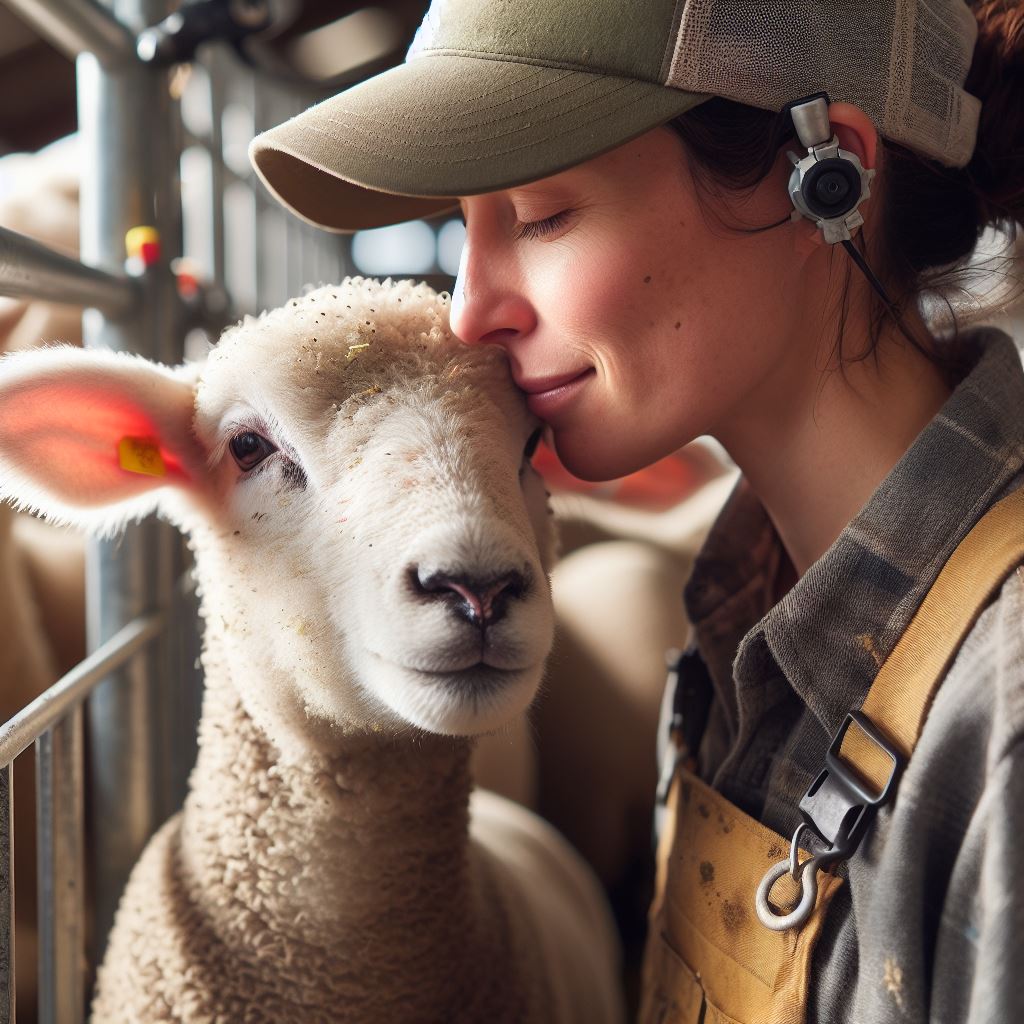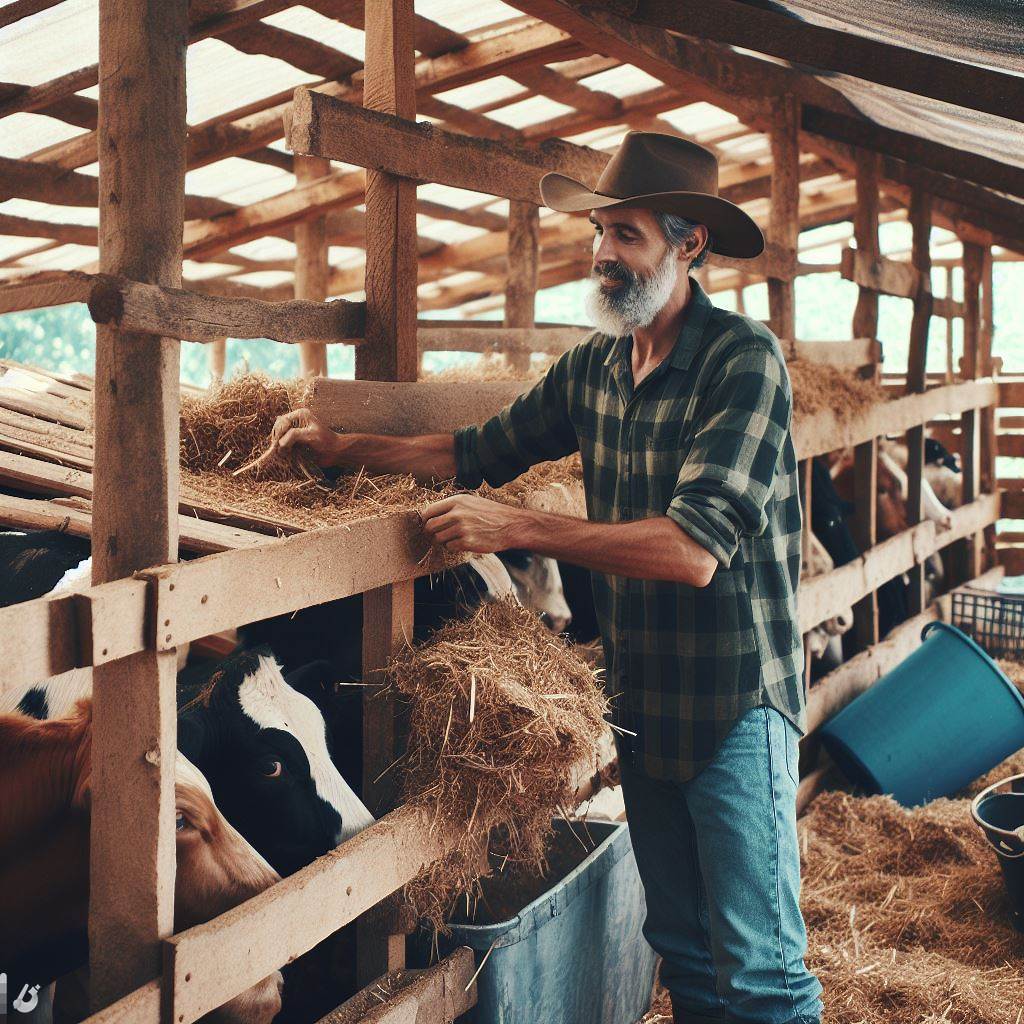Introduction
Sheep are fascinating creatures that require proper nutrition for their overall health and well-being.
Importance of healthy feeding for sheep
Healthy feeding is crucial for sheep as it directly impacts their growth, reproduction, and overall productivity.
Ensuring healthy feeding for sheep is crucial for their overall well-being and productivity.
A balanced diet rich in essential nutrients supports growth, reproductive health, and immune function.
Adequate nutrition enhances wool quality and meat yield, contributing to profitable farming.
Additionally, proper feeding prevents malnutrition-related diseases, fostering a robust and resilient flock.
Understanding the nutritional needs of sheep
Feeding sheep adequately is crucial for their overall health and productivity.
Understanding the nutritional requirements of sheep at different stages of life can help ensure optimal health and performance.
Different stages of sheep’s life and their nutritional requirements
Lambs, especially during the first few months, require a balanced diet rich in energy, protein, vitamins, and minerals.
Adequate nutrition at this stage supports proper growth and development.
Ewes during pregnancy have increased energy and protein needs for fetal development.
Providing them with a well-balanced diet promotes healthy pregnancies and ensures the birth of strong lambs.
Lactating ewes need higher energy, protein, and mineral intake to support milk production.
Nutritional deficiencies at this stage can negatively impact both the ewe’s health and the growth of the lambs.
Mature sheep have lower energy and protein requirements, focusing more on fiber intake.
Transform Your Agribusiness
Unlock your farm's potential with expert advice tailored to your needs. Get actionable steps that drive real results.
Get StartedA diet rich in good-quality forage and pasture is essential to meet their nutritional needs.
Key nutrients needed for optimal sheep health
Protein is crucial for the growth, maintenance, and repair of body tissues.
It is especially important during times of rapid growth, such as in lambs and pregnant ewes.
Good sources of protein include legumes and protein-rich grains.
Energy is required for metabolic processes, body heat regulation, and physical activity.
It is obtained from carbohydrates and fats present in the diet.
Adequate energy levels are necessary for productive sheep.
Fiber, specifically in the form of long-stemmed forage, is necessary for proper digestion and gut health in sheep.
It aids in maintaining a healthy rumen and prevents digestive disorders.
Vitamins play a vital role in various bodily processes, including metabolism, immune function, and reproduction.
Offering a well-balanced diet with a variety of forages and feed sources ensures an adequate vitamin intake.
Minerals, such as calcium, phosphorus, and selenium, are essential for bone development, nerve function, and enzyme reactions.
Sheep may require mineral supplements to address deficiencies in their grazing areas.
Role of feed quality and proper supplementation
High-quality forage and pasture should form the foundation of a sheep’s diet.
Fresh, nutritious forage provides a balanced mix of nutrients necessary for optimal health and performance.
Supplementary feeding may be necessary during periods of low forage availability, such as during winter or drought.
Ensuring sheep have access to additional feed helps maintain their nutritional needs during these times.
It is crucial to ensure that the feed is free from molds, toxins, and contaminants.
Poor-quality feed can lead to health issues and prevent the sheep from obtaining the necessary nutrients for growth and productivity.
Provide mineral supplements to address deficiencies in the grazing area.
Conducting pasture soil tests and consulting with a veterinarian can help determine the specific mineral needs of the sheep flock.
Regularly assess the body condition of the sheep and adjust feeding accordingly.
Overfeeding can lead to obesity and related health problems, while underfeeding can result in malnourishment and decreased productivity.
By understanding the nutritional needs of sheep and providing a properly balanced diet, sheep owners can ensure the health and well-being of their flocks.
Showcase Your Farming Business
Publish your professional farming services profile on our blog for a one-time fee of $200 and reach a dedicated audience of farmers and agribusiness owners.
Publish Your ProfileProper nutrition leads to productive and thriving sheep, contributing to the overall success of the farming operation.
Read: Sheep Farming: Basics & Innovations
Feeding routine and management
Establishing a regular feeding schedule
Feeding sheep at consistent times helps maintain their digestive health and overall well-being.
A regular feeding schedule minimizes stress and keeps their metabolism in balance.
Determining appropriate feeding quantities based on body condition
It is crucial to assess a sheep’s body condition score to determine its nutritional needs accurately.
Underfeeding can lead to deficiencies, while overfeeding can cause obesity and related health issues.
To determine the appropriate feeding quantities, evaluate the sheep’s weight, muscle tone, and fat distribution.
Adjust the amounts accordingly to achieve the ideal body condition score for optimal health.
Ensuring access to clean and fresh water at all times
Water is essential for digestion, nutrient absorption, thermoregulation, and overall sheep health.
Sheep need constant access to clean, fresh water to stay hydrated and maintain proper bodily functions.
Make sure water troughs or containers are clean, free from contaminants, and regularly refilled to keep the water fresh.
Monitor water sources during extreme weather conditions to prevent freezing or overheating.
Proper feeding management is vital to ensure the health and vitality of your sheep.
Implementing a well-planned routine not only benefits their physical well-being but also enhances their productivity and performance.
Feeding considerations for different sheep categories
Feeding pregnant ewes
During pregnancy, a ewe’s nutritional requirements increase to support her own body and the growing fetus(es).
Adequate feeding during this crucial period can positively impact lamb birth weight and ensure a successful breeding season.
Provide pregnant ewes with high-quality forage, such as alfalfa or clover, to meet their increased energy needs.
It is also advisable to supplement their diet with concentrate feeds containing essential nutrients like vitamins and minerals.
Feeding lactating ewes
Lactating ewes have heightened nutritional demands due to milk production.
Proper feeding during this phase is essential for successful lamb growth and development.
Offer lactating ewes a diet rich in energy and protein.
High-quality forage and concentrate feeds are crucial to support optimal milk production, ensuring well-nourished lambs and healthy mothers.
Feeding growing lambs
Growing lambs have rapid growth rates and require a specially formulated diet to meet their nutritional requirements.
Proper nutrition during this stage lays the foundation for their future health and productivity.
Provide growing lambs with high-quality forage, supplemented with concentrate feeds designed for their specific needs.
Monitor their growth rate and adjust the feeding regimen accordingly to avoid under or overfeeding.
Feeding breeding rams
Breeding rams play a significant role in the flock’s reproductive success.
Proper nutrition is crucial to ensure their fertility, libido, and overall vitality.
Offer breeding rams a balanced diet that includes high-quality forage and concentrate feeds.
Monitor their body condition closely and adjust their feeding program to maintain optimal health and reproductive performance.
By considering the specific nutritional needs of different sheep categories, you can tailor their feeding program accordingly, effectively supporting their growth, reproduction, and overall well-being.
In summary, developing a feeding routine and management plan is essential for maintaining healthy sheep.
Establishing a regular feeding schedule, determining appropriate feeding quantities based on body condition, and ensuring access to clean water are key factors for their well-being.
Additionally, understanding the unique feeding requirements of pregnant ewes, lactating ewes, growing lambs, and breeding rams allows you to provide tailored nutrition for each category.
By prioritizing proper feeding techniques, you can promote the overall health and productivity of your sheep flock.
Read: Sheep & Goat Vaccination Schedules
Selecting the right type of feed
Types of forage suitable for sheep
- Grass hay, such as timothy, orchard grass, and bermudagrass, provides essential nutrients.
- Legume hay, like alfalfa and clover, is high in protein and excellent for lactating ewes.
- Silage made from corn or grasses can be a nutritious option if properly fermented.
Providing a balanced diet through pasture management
- Rotate pastures regularly to avoid overgrazing and promote healthy grass regrowth.
- Ensure pastures are free from poisonous plants, like ragwort or bracken fern.
- Monitor grazing patterns and adjust flock size or supplementary feeding accordingly.
Supplementing with grain or concentrates if necessary
- Assess sheep’s body condition by checking their ribs and tail fat to determine if supplementation is required.
- Gradually introduce grain or concentrates to their diet to prevent digestive upsets.
- Consult a veterinarian or animal nutritionist to determine the appropriate type and amount of supplements.
Ensuring proper feeding practices
Providing fresh and clean water
- Sheep require access to clean water at all times. Ensure water sources are regularly checked and cleaned.
- Use troughs or tanks that can hold an adequate amount of water for the entire flock.
- During extreme weather conditions, provide extra water to prevent dehydration.
Avoiding sudden changes in diet
- Sheep have sensitive digestive systems, so any sudden changes in their diet can lead to digestive disorders.
- Introduce new feed gradually over a period of 7-10 days, mixing it with their existing diet.
- Observe the sheep closely during the transition period for any signs of discomfort or illness.
Feeding at appropriate times and amounts
- Divide the daily feed ration into at least two equal portions, feeding half in the morning and the other half in the afternoon.
- Adjust feed quantities based on the sheep’s age, weight, reproductive stage, and activity level.
- Avoid excessive feeding to prevent obesity and related health issues.
Regularly assessing body condition
- Monitor sheep’s body condition regularly by visually assessing their appearance and feeling their muscle and fat cover.
- Adjust feeding practices accordingly to maintain an ideal body condition score and overall health.
- Seek professional advice if you are unsure about evaluating body condition or making necessary adjustments.
Ultimately, selecting the right type of feed for sheep, managing pasture effectively, and providing necessary supplements play crucial roles in ensuring the health and well-being of the flock.
By following these feeding tips, sheep owners can promote optimal nutrition and maximize the productivity of their sheep herds. Remember to consult experts for personalized advice based on your specific flock’s needs.
Read: Eco Sheep Farming: Key Points
Feed storage and handling
Proper feed storage and handling are essential for ensuring the health and well-being of your sheep.
Showcase Your Farming Business
Publish your professional farming services profile on our blog for a one-time fee of $200 and reach a dedicated audience of farmers and agribusiness owners.
Publish Your ProfileBy following these tips, you can maintain feed quality and prevent issues such as mold, pests, and contamination.
Proper storage conditions to maintain feed quality
- Choose a dedicated storage area: Select a well-ventilated, dry, and clean space to store your sheep feed.
- Keep feed off the ground: Elevate the feed using pallets or shelves to avoid moisture and pests.
- Use appropriate containers: Store feed in sealed, rodent-proof bins or feeders to prevent contamination.
- Protect feed from temperature changes: Avoid exposure to extreme heat or cold as it can compromise feed quality.
- Store different feed types separately: Keep grains, hay, and supplements in separate containers to prevent cross-contamination.
Preventing mold, pests, and contamination
- Regularly clean storage area: Sweep and remove any spilled feed, dust, or debris to prevent mold growth and infestation.
- Inspect feed bags for damage: Check for tears, holes, or signs of pests before storing feed to avoid contamination.
- Use feed within expiration dates: Don’t use outdated feed as it may deteriorate, lose nutrients, or develop mold.
- Monitor for signs of pests: Keep an eye out for droppings or live insects in the storage area and take appropriate measures if needed.
- Practice first-in, first-out (FIFO): Rotate feed stock by using older feed first to ensure freshness and prevent spoilage.
Importance of regularly inspecting and rotating feed stock
- Check for signs of spoilage: Examine the color, smell, and texture of the feed regularly to detect any signs of mold or degradation.
- Monitor feed consumption: Keep track of how much feed your sheep are consuming to avoid overfeeding or underfeeding.
- Rotate feed bins: Switch the location of feed containers to prevent the accumulation of moisture, pests, or mold in one area.
- Clean feeders regularly: Remove old or spoiled feed from feeders, clean them thoroughly, and refill with fresh feed.
- Consult with a nutritionist: Work with a professional to develop a feeding plan that meets your sheep’s nutritional requirements.
Remember, healthy sheep start with proper feed storage and handling.
By maintaining optimal storage conditions, preventing mold and contamination, and regularly inspecting and rotating feed stock, you can ensure a nutritious diet for your flock and promote their overall well-being.
Read: Sustainable Sheep Rearing Tips

Find Out More: Layer vs. Broiler: Choosing Your Poultry Path
Preventing common feeding problems
Recognizing signs of malnutrition or overfeeding
- Observing if the sheep has a dull and rough coat can indicate malnutrition.
- Excessively thin or overweight sheep are signs of malnutrition or overfeeding, respectively.
- Lack of energy or low activity level can be a result of inadequate nutrition.
- Overgrown or cracked hooves can also indicate a feeding problem.
- It is essential to monitor the sheep’s body condition score regularly to prevent feeding issues.
Addressing common deficiencies through proper supplementation
- Providing a balanced diet with adequate levels of protein, carbohydrates, fats, vitamins, and minerals is crucial.
- Hay and pasture should be the foundation of a sheep’s diet for sufficient fiber intake.
- Assess the nutritional content of the forage, and supplement if necessary to meet the sheep’s requirements.
- Specific minerals like copper, zinc, selenium, and iodine are commonly deficient and may require supplementation.
- Consult with a livestock nutritionist to determine the appropriate supplementation strategy for your sheep.
Regular health checks and consulting with a veterinarian
- Regular health checks aid in identifying early signs of disease or nutritional deficiencies.
- A veterinarian should evaluate the overall health of the sheep and provide guidance on proper nutrition.
- Discuss the sheep’s diet and any concerns regarding their feeding habits with the veterinarian.
- Inquire about appropriate vaccinations and deworming schedules to maintain optimal health.
- Professionals can provide personalized advice to ensure the specific needs of your sheep are met.
By being attentive to signs of malnutrition or overfeeding, addressing deficiencies, and seeking professional guidance, you can prevent common feeding problems in sheep.
Regular health checks and consultations with a veterinarian play a crucial role in maintaining the overall well-being of your flock.
Special considerations for lambing and lactation
Increased nutritional requirements during pregnancy and nursing
During pregnancy, the ewe’s nutritional requirements increase due to the growing lambs inside her.
Adequate energy, protein, vitamins, and minerals should be provided through a well-balanced diet.
Feeding pregnant ewes should be done twice a day, ensuring they receive enough nutrients to support both their own needs and the development of the lambs.
As the ewe approaches the lambing period, the nutritional demands further escalate.
High-quality forage and supplements should be provided to meet the increased energy requirements.
This ensures that the ewe has enough reserves to support the demanding task of giving birth and producing milk for the lambs.
During the lambing and lactation period, the nutritional needs of the ewe increase significantly.
It is crucial to provide adequate nutrition to support the growth and development of both the ewe and the lambs.
Providing adequate nutrients for optimal lamb growth
After lambing, the lactation phase begins, where the ewe’s nutritional requirements reach their peak.
Adequate protein, energy, and minerals are necessary for optimum milk production.
This promotes healthy lamb growth and helps build strong immune systems in the lambs.
The growth of lambs is directly influenced by their mother’s diet.
To ensure optimal lamb growth, it is important to provide the ewe with a balanced diet that contains all the necessary nutrients.
Monitoring ewe’s body condition and adjusting feed accordingly
Regularly monitoring the body condition of the ewe is essential during lambing and lactation.
Adjustments in feed should be made based on the ewe’s body condition to maintain her health and ensure proper milk production.
It is important to assess the ewe’s body condition regularly during lambing and lactation.
Body condition scoring can help determine if she is receiving enough nutrients.
Adjustments in feed can be made accordingly to maintain optimal body condition and milk production.
Feeding the ewe should be done in a way that supports her lactation needs and promotes lamb growth.
A diet rich in high-quality forage, supplemented with concentrates, can ensure adequate nutrition.
The concentrates should be gradually introduced and increased as needed, considering the ewe’s body condition and milk production.
Water is also essential during this critical period.
The ewe should always have access to clean and fresh water.
Proper hydration promotes optimal milk production, digestion, and overall health of the ewe and her lambs.
Overall, lambing and lactation are crucial stages in a sheep’s life cycle, and proper nutrition is vital.
Providing increased nutritional requirements, monitoring the ewe’s body condition, and adjusting the feed accordingly are essential for healthy sheep and optimal lamb growth.
Conclusion
Summary of key feeding tips discussed
In summary, we have discussed several key feeding tips for healthy sheep.
Importance of healthy feeding for sheep
Healthy feeding is paramount for sheep to thrive.
A balanced diet ensures optimal growth, reproduction, and immune function.
Nutrient-rich forage and supplements sustain sheep health, promoting strong wool, efficient weight gain, and overall vitality.
Prioritizing proper nutrition safeguards against diseases, contributing to a robust and thriving flock.
It is crucial to emphasize the importance of healthy feeding practices for the well-being of sheep.
Encouragement for readers to implement the tips for better sheep health and productivity.
We encourage readers to implement these tips to enhance sheep health and productivity.
Showcase Your Farming Business
Publish your professional farming services profile on our blog for a one-time fee of $200 and reach a dedicated audience of farmers and agribusiness owners.
Publish Your Profile



